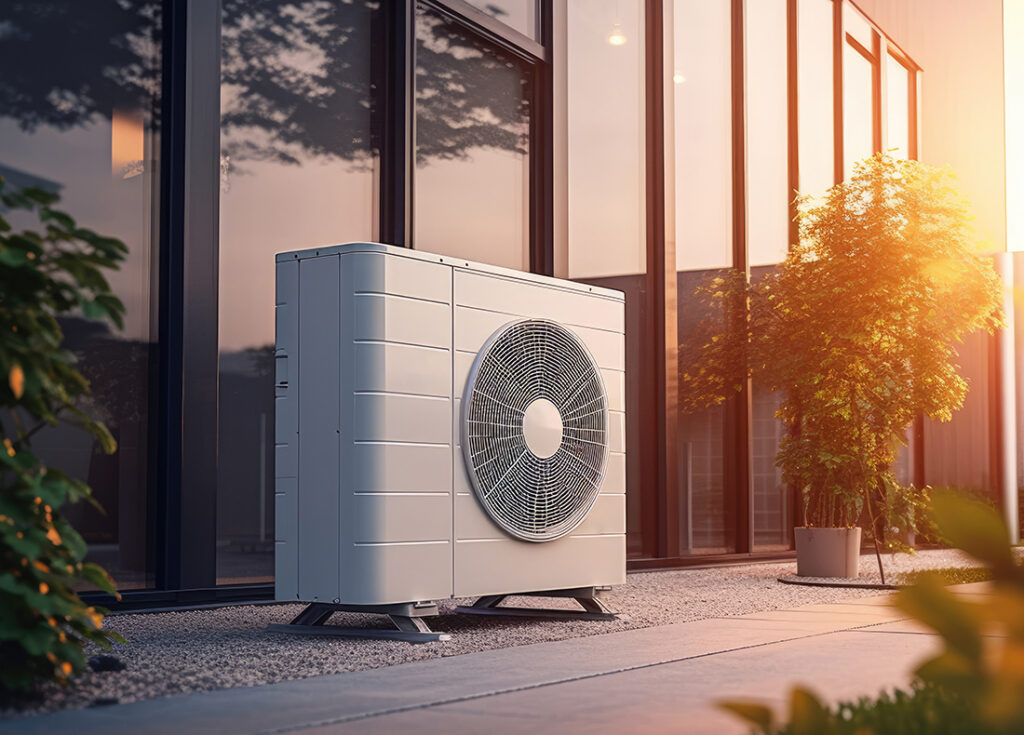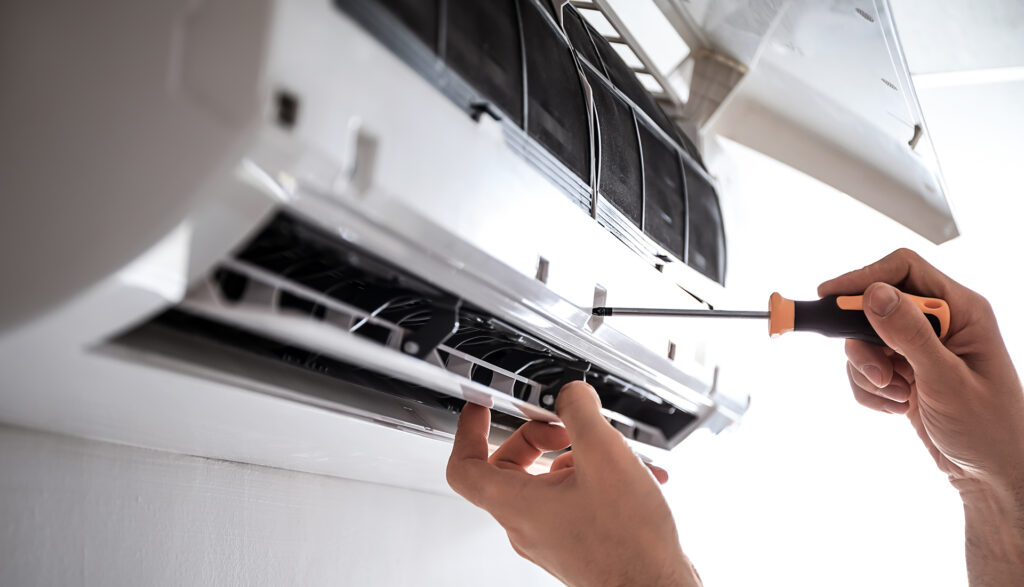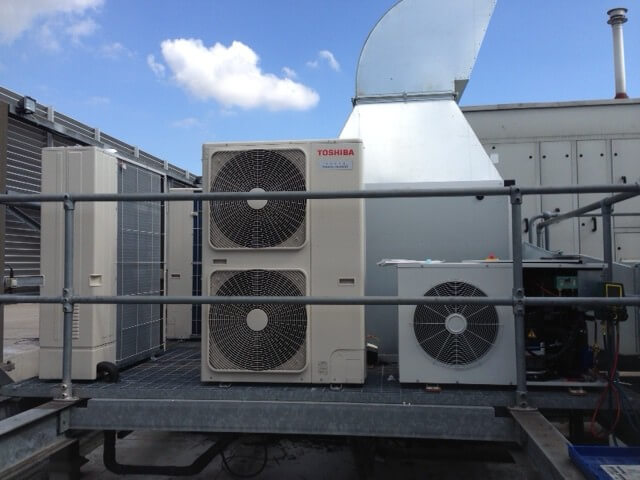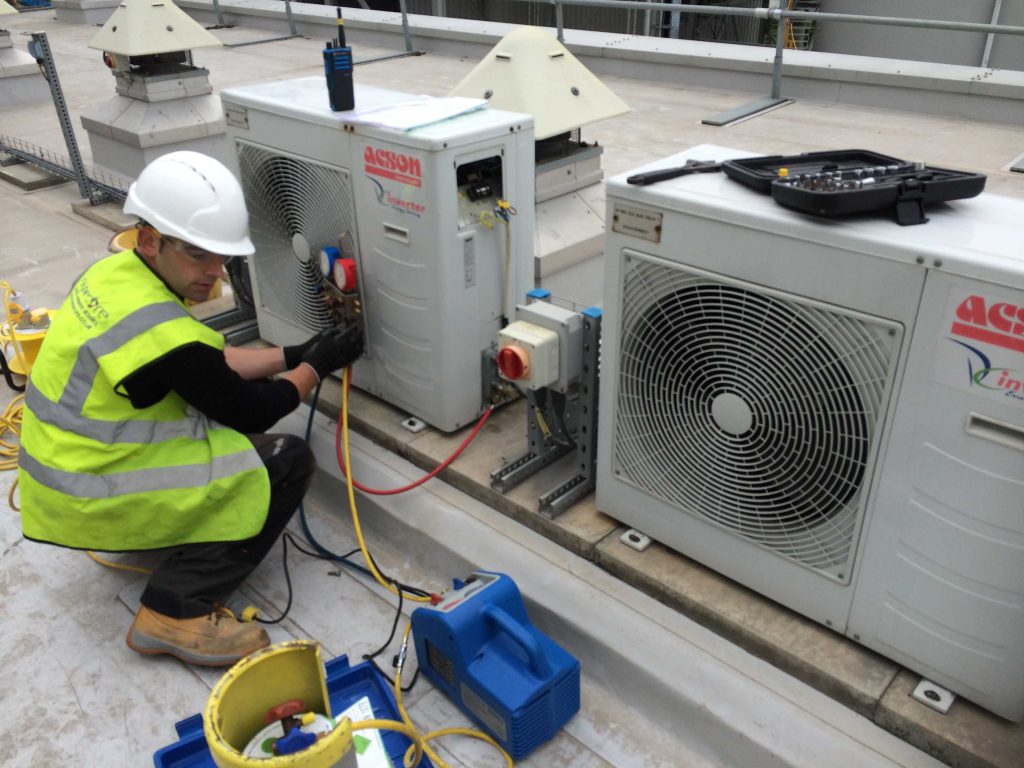CIBSE TM44 Assessment, A Legal Requirement For Air Conditioning Systems
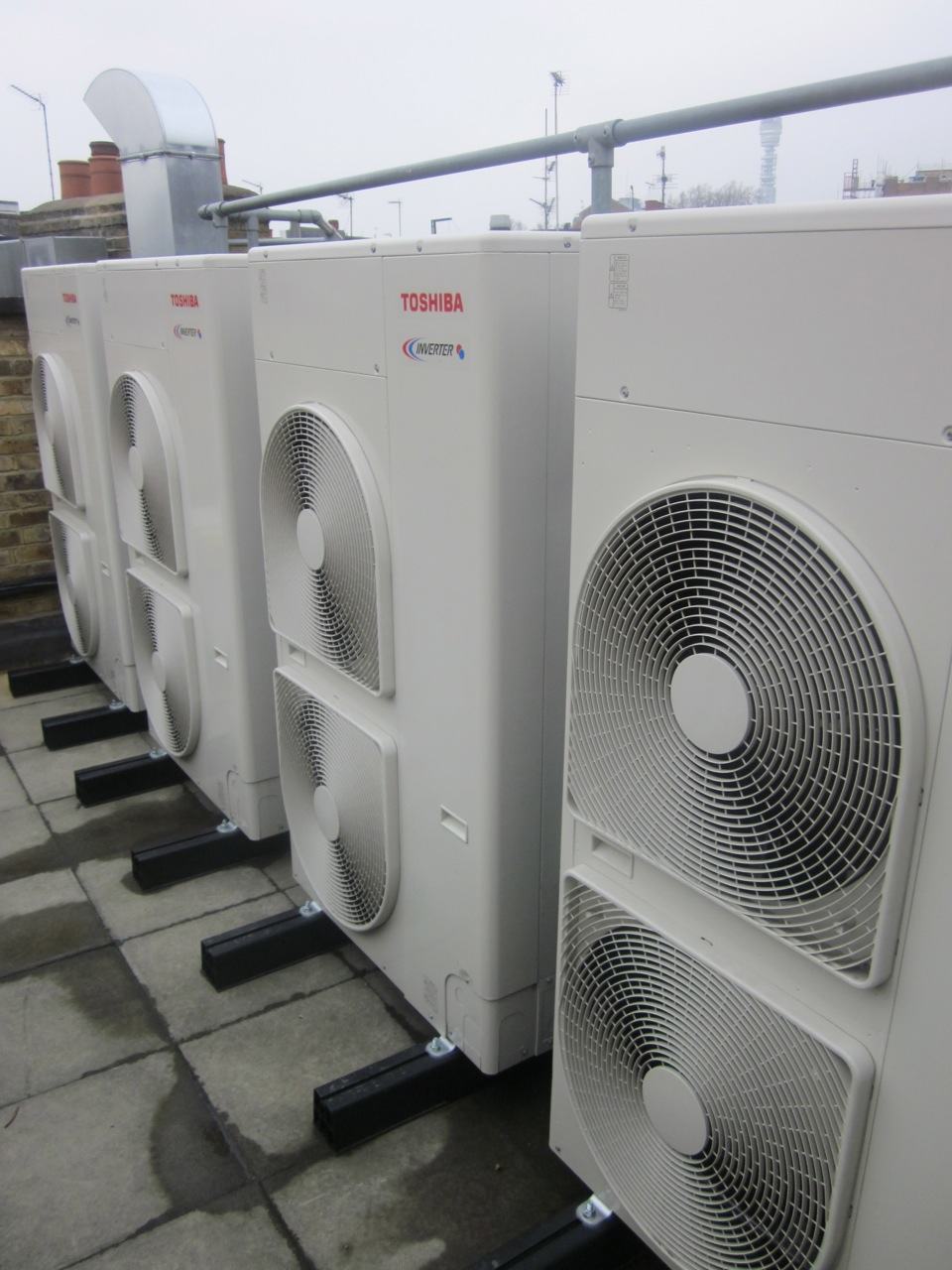
Estimated reading time 10 minutes
In this article we look at the need to ensure a CIBSE TM44 air conditioning energy efficiency assessment is carried out, in order to comply with UK legislation, which is based on the Energy Performance of Buildings (England and Wales) Regulations 2012, as amended in 2020 (the EPB regulations), which requires building owners or managers to undertake regular inspections of air conditioning systems.
Is A CIBSE TM44 Assessment Required?
All air conditioning systems with a combined rated output of more than 12kW require a CIBSE TM44 assessment no more than every 5 years, carried out by an accredited energy assessor and recorded on the NDEPC register. This includes any system where individual air conditioning units are less then 12KW but whose combined effective rated output is more than 12kW.
For additional clarity the Department for Communities and Local Government “Improving the energy efficiency of our buildings” guide provides definitions for a system:
A system as “a combination of all components required to provide a form of air treatment in which the temperature is controlled, or can be lowered, and includes systems which combine such air treatment with the control of ventilation, humidity and air cleanliness.” They go onto say that “this includes both fixed self-contained systems, such as split systems and centralized systems. Mechanical ventilation systems that provide no mechanical cooling themselves but serve spaces that are cooled by other means are included. Any components contained in air conditioning systems that are only intended to provide heating are excluded. Air conditioning systems that provide refrigeration for process applications, such as server rooms, would also require an inspection if that part of the system allows an inspection to be carried out” and as “one that is considered to be one or more air conditioning units within a building controlled by a single person for the purposes of the regulations.”
How Do I Find Out The Effective Rated Output Of My System?
The effective rated output of an individual air conditioning unit or system should be displayed on the system located on the rating plate at the back or side of both indoor and outdoor units in kilowatts (kW) or watts (W). It may also be given in the operating manual. Where the system is under a maintenance contract there should be a record of the effective rated output in the maintenance records.
Who Is Responsible For Getting A CIBSE TM44 Assessment?
The person who controls the system i.e. the person who controls the technical functioning of the system, usually the owner, office manager or facilities manager, not someone who can just adjust the temperature or whose only responsibility is to adjust the controls is responsible for making sure that a CIBSE TM44 assessment is carried out in a timely fashion.
What Does A CIBSE TM44 Assessment Cover?
During the assessment the assessor will examine any refrigeration and air-moving equipment and the system’s controls. They will also look at any documentation and records that detail how the system has been maintained to understand what maintenance the system has received. The assessor is also responsible for estimating whether the system is suitably sized for the space that it needs to cool and providing advice on any ways where improvement to the energy efficiency of the system can be made.
Indoor and outdoor refrigeration equipment and associated heat exchange systems are checked. The assessor will look for indicators of damage, lack of maintenance, access to adequate air flow due by blockages due to dust or debris that would result in a decrease in efficiency. The air conditioning system is assessed for damage to, or blockage of filters, grilles, screens or pre-filters and heat exchangers, and the fan type and method of control.
The air conditioning system controls are also assessed for inefficiencies including inappropriate control methods, incorrect control settings and poorly located sensors. The assessor will briefly look at the temperatures which are set for the spaces they are regulating, the time periods during which they are to be temperature controlled, the appropriateness of the control zones, control sensors and their locations, the potential for cooling to be operated at the same time as heating, the method of refrigeration capacity control and the method of air flow rate control.
The air conditioning energy assessor will need a list of all relevant records prior to the inspection and for site records to be made readily available. This could include e.g. catalogue information and details provided during installation and commissioning and maintenance of the system. Any existing planned maintenance schedule or of other recent maintenance activities should also be provided.
Common Issues Found On CIBSE TM44 Inspections
There are several common issues that are identified when a TM44 inspection is carried out. These include poor installation, faulty controls, incorrect date or time on the programmer, incorrect temperature settings, poor maintenance of filters and coils; poor insulation of ducts and pipework; refrigerant leaks or use of old refrigerants and obsolete systems. These are just some of the issues found, other issues and faults may also be found.
What Is The Purpose Of The Assessment?
The overall purpose of the CIBSE TM44 inspection and resulting report is to improve the energy efficiency of the air conditioning system, reduce energy consumption, decrease operating, maintenance costs and carbon emissions as well as identifying faults. With today’s rising energy costs ensuring efficient energy consumption and reducing a building’s operating costs can only be a good thing.
Advice On Improving Efficiency
The building owner or manager are provided with information that gives an indication of the likely efficiency of the air conditioning systems, together with some initial advice on how energy efficiency or effectiveness might be improved.
3 levels of energy efficiency are usually found when systems are assessed. These are:
- systems where inefficiencies are present and are due to faults, neglect or misuse
- systems where efficiency is lower than the accepted minimum due to design or use and
- systems that are efficient.
From these 3 levels of energy efficiency an air conditioning inspection report will be produced by the assessor and will typically include the following information:
- the likely efficiency of the air conditioning system including best practice improvement advice to raise standards even where systems are fully compliant with the current minimum provisions of building regulations or standards
- any faults identified during the inspection and advice or suggestions for improvement on how to rectify faults in the system that are compromising its efficiency
- the adequacy of the maintenance of the equipment and advice or suggestions for improvement
- the adequacy of the controls and settings and improvement advice to bring the system to a standard of efficiency consistent with the current minimum provisions of building regulations or standards
- the current size of the system in relation to the cooling load (the amount of heat energy removed from a space to maintain a desired temperature and humidity level) and advice or suggestions for improvement
- how to reduce air conditioning use and
- a summary of the report outlining the findings and key recommendations.
Where systems are older and are using refrigerants which are being phased out e.g. R22 – a gas which is now banned by the EU for its harmful global warming effects – or where their use and supply is restricted, under regulations which aim to phase out ozone depleting substances, advice may be given on what other options are available regarding replacing the system with a new air conditioning system. Today’s new air conditioning systems are far more energy efficient and will pay for themselves through the savings that will be made in energy bills. Replacing an old air conditioning system with new energy efficient system will also help to reduce CO2 emissions.
Once received, the TM44 report should be kept in a safe place and used to inform subsequent inspections.
Do I Need To Follow The TM44 Report’s Recommendations?
While there is no legal requirement to act on the recommendations in the report, following the report’s recommendations and acting on the advice by rectifying any faults or making improvements where specified will improve the running of your air conditioning system so that it runs more efficiently. This in turn will reduce the system’s operating costs, saving you money.
Any business that fails to provide a valid CIBSE TM44 inspection report when requested by their local authority can be fined a penalty charge notice of £300. Further penalty charges of £200 can be issued for failure to comply with a request for a TM44 report within 7 days of the initial request.
A TM44 inspection report is now required when selling or letting a property, along with other energy efficiency assessments for your building.
Maintaining Your Air Conditioning System
Carrying out preventative maintenance of your air conditioning system can ensure it performs throughout the year, no matter the outside weather, keeping your building space at a comfortable set temperature. Without regular maintenance your air conditioning system can develop faults, parts can breakdown which in turn can affect other working parts which may end up leading to a catastrophic failure of the system and subsequent breakdown and loss of air conditioning.
Synecore offers a commercial air conditioning Planned Preventative Maintenance (PPM) service, from inspecting the system to look for any issues; to checking the control panel, thermostat settings and sensors, electrical connections and ductwork to changing the filters and cleaning the condenser and evaporator coils to looking for leaks, lubricating moving parts and fully testing the system.
Synecore’s PPM service not only allows you to comply with TM44 certification it also provides compliancy with F-gas regulations which is another legal obligation for all owners of air conditioning who operate stationary air-conditioning and refrigeration equipment and refrigeration units of refrigerated trucks and trailers which contain F-gas, with a CO2 equivalent charge of 5 tonnes or above. As part of F-gas compliancy, systems must be serviced, maintained and leak tested and a record of maintenance and servicing kept of the equipment you operate or service for 5 years.
How often you the equipment is checked depends on the CO2 equivalent charge weight of the system:
- 5-50 tonnes and above – at least every 12 months.
- 50-500 tonnes and above – at least every 6 months.
- 500 tonnes and above – at least every 3 months.
If you install a system which allows automatic detection of F-gas leaks, you can double the period of time allowed between leak checks. If your equipment contains an F-gas equivalent of 500 tonnes or more of carbon dioxide then you must fit a leak detection system.
All PPM packages are tailor made for your business and are dependent on the size of the premises and the AC installed. As part of the PPM air conditioning package Synecore schedules site visits throughout the year to keep your air conditioning system performing at peak efficiency. The PPM package ensures your equipment is back up and running as soon as possible. Our customers receive high priority status for any air conditioning breakdowns and repairs, with an engineer onsite within hours of the fault being reported.
Expert Heating, Ventilation and Air Conditioning Installation and Support
Syncore is an expert in air conditioning, heating and ventilation design and installation and can install air conditioning and heating, ventilation and air conditioning (HVAC), and heat pumps throughout London and the wider UK.
Synecore is an approved supplier and installation expert for air conditioning brands, Mitsubishi Electric, Toshiba and Daikin. These brands are the disruptors in developing clean and efficient cooling and heating solutions for commercial and residential properties.
If you are looking to install a new heating, ventilation and air conditioning installation or heat pump or need to replace an old system, contact our team or call on 01795 509 509. We’ll talk you through your options and provide you with expert advice on the right heating, ventilation and air conditioning system for you.
